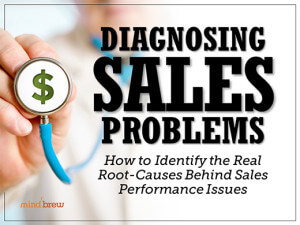The downstairs toilet in my house isn’t working right now.
On discovering the problem, my oldest son immediately blamed my youngest son, who had the misfortune of being the last person to use the bathroom before it broke. Because my firstborn is both highly intelligent and very skillful at persuasion, he easily convinced the middle brother that the little guy was the problem. And they suggested a whole lot of solutions to the problem, from modifying the youngest’s diet to giving him away to any family that would have him.
In reality, a small piece inside the toilet tank has broken. It will take a $10 part and about 10 minutes to fix it.
And I’m not planning to give away any of my sons anytime soon.
This little family drama is a good example of what can happen to the sales ops team in a B2B company. In the same way that my 10-year-old became the scapegoat for something that wasn’t his fault at all, sales ops often takes the fall for things they had no part in. Here’s why:
- Sales ops is usually involved in many different parts of the sales process. So when something happens they are probably nearby. But proximity to the problem doesn’t mean that you caused it.
- Many B2B firms have become conditioned to accept their salespeople’s opinions. The sales team has the most direct contact with the customers, and they often fill the role of being the customers’ proxy within the organization. When sales says something is wrong, the company is going to immediately drop everything to fix it. And if sales offers a particular interpretation for why something is happening — no one is going to second-guess them.
- It’s human nature to want a quick fix — and the quickest “fix” to any problem is to point the finger at someone else. It’s faster — and sometimes more satisfying — to say that another department caused the problem than to do the hard work involved with investigating and resolving the true issue.
If you found yourself nodding along as you read these reasons, you should understand that you aren’t alone. Most B2B sales ops teams deal with these problems regularly.
And if you haven’t had this experience yet, be on your guard, because you probably will.
Fortunately, you don’t have to take the blame. Instead, you can perform the function the organization desperately needs — the root cause analysis that will that will point out the true reason for the problem and suggest a likely means of remedying it.
The best way to deal with this problem is to avoid it altogether by identifying and diagnosing the problem before anyone else finds it. For help with that process, watch the Diagnosing Sales Problems webinar. It lays out a simple diagnostic technique that can help you get to the true root cause of any problem. And it includes several real-world examples of sales problems where the origin of the issue wasn’t immediately obvious.
In the meantime, if you need me, I’ll be in the plumbing aisle at my local home improvement store.












